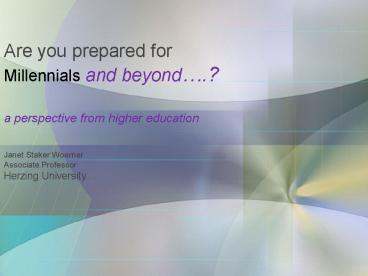Are you prepared for Millennials and beyond - PowerPoint PPT Presentation
1 / 16
Title:
Are you prepared for Millennials and beyond
Description:
Title: Entrepreneuars Author: Janet Woerner Last modified by: Owner Created Date: 6/6/2006 3:30:29 PM Document presentation format: On-screen Show (4:3) – PowerPoint PPT presentation
Number of Views:189
Avg rating:3.0/5.0
Title: Are you prepared for Millennials and beyond
1
Are you prepared forMillennials and beyond.?a
perspective from higher educationJanet Staker
Woerner Associate ProfessorHerzing
University
2
Conversation
3
Context
4
Learning Organization
5
And one other factor.
6
Pew Institute
Generation Name Birth Years In 2010 of total adult population of internet-using population
Millennial Born 1977-1992 Ages 18-33 30 35
Gen X Born 1965-1976 34-45 19 21
Younger Boomers Born 1955-1964 Ages 46-55 20 20
Older Boomers Born 1946-1954 Ages 56-64 14 13
Silent Generation Born 1937-1945 Ages 65-73 7 5
G.I. Generation Born 1936, Age 74 9 3
7
Millennials- Fast Facts
- Diverse
- Achievement orientated
- Conventional
- Not afraid of failure
- Virtual
- Sense of Social Responsibility
- Impatient
- Active/hands-on learners/multi taskers
- Challenge authority
- Spending power exceeds 200 billion
- Independent
- Strong views
- Programmed and team oriented.
- Stressed. Compared with five years ago, 81 of
college mental health service directors reported
an increase in students with serious
psychological problems. . - Howe and Strauss- Generational Learning Styles
Julie Coates 2007
8
Reality in Education today
- On average across Organization for Economic
Co-operation and Development (OECD) countries,
the proportion of people with at least an upper
secondary education has risen from 45 to 81. - OECD (2011), Education at Glance 2011
OECD Indicators, OECD Publishing. - http//dx.doi.org/10.1787/eag-2011-en
- 92 of ages use online video students expect
to be entertained - Education is one of the strongest predictors of
having more close social ties. Those with a
4-year university degree average 12 more close
ties than those with only a high school diploma
Pew Institute - HERI (Higher Education Research Institute) 2007
data show - ? The top 5 life goals for college-bound students
have - not changed much over the year
9
So
10
Generation Z
11
Generation Z
12
The Challenge
- Experiential learning opportunities
- Learning communities informal learning
- Expectations shared up-front
- Feedback
- Utilization of their talents.
- Systems approach to problems.
- Flexibility for creativity
- Multiple options for performance
- Plan focus time in short segments
- Technology open classroom
- Generational Learning Julie Coates 2007
13
New Ways to Learn
14
Needed Skills for today and the future
- Education
- Social Networking
- Literacy on a Holistic Scale
- Foresight and Insight
- Innovation
- Leadership
- Life Long Learning Florida, R. Rise of
Creative Class - http//www.21stcenturyskills.org/
15
Peter Drucker
- We must now accept the fact that learning is a
lifelong process of keeping abreast of change.
And the most pressing task is to teach people how
to learn. - American management guru ( 1909 - 2005)
16
Thank you
- Questions
- Contact me at
- Janet Staker Woerner
- jstakerwoerner_at_msn.herzing.edu
- http//www.linkedin.com/in/janetstakerwoerner































